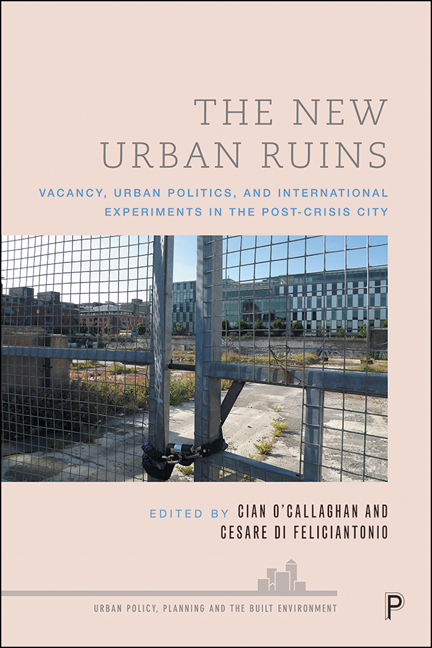Book contents
- Frontmatter
- Contents
- List of figures and tables
- Notes on contributors
- Acknowledgements
- Introduction
- PART I Rethinking ruination in the post-crisis context
- PART II The political economy of urban vacant space
- PART III Reappropriating urban vacant spaces
- Conclusion: Centring vacancy – towards a research agenda
- Index
6 - Conflicting rationalities and messy actualities of dealing with vacant housing in Halle/Saale, East Germany
Published online by Cambridge University Press: 13 May 2022
- Frontmatter
- Contents
- List of figures and tables
- Notes on contributors
- Acknowledgements
- Introduction
- PART I Rethinking ruination in the post-crisis context
- PART II The political economy of urban vacant space
- PART III Reappropriating urban vacant spaces
- Conclusion: Centring vacancy – towards a research agenda
- Index
Summary
Introduction: conceptualising urban vacancy
After German reunification, like many other cities in East Germany, Halle/Saale in the federal state of Saxony Anhalt underwent a period of urban decline. It lost a large share of jobs and around 25 per cent of its population between 1990 and 2010. Some people relocated elsewhere for jobs; others moved to a single-family house in the region (something previously impossible due to the German Democratic Republic's [GDR’s] strict limitations on suburbanisation). As a consequence, the rate of vacant housing in Halle/Saale and many other East German towns and cities intensified. Urban vacancy eventually became one of the main fields of policy intervention on a local, regional and national level in Germany. In recent years, urban vacancy has received increasing scholarly attention in the field of urban studies. Two main points of reference can be distinguished: post-industrial and post-socialist urban decline and depopulation, often subsumed as ‘urban shrinkage’ (Haase et al, 2014); and the aftermath of the financial crisis in 2008, often explored as austerity urbanism (Tonkiss, 2013). It can be argued that despite some important differences, in both contexts, urban vacancy is considered as a symbolic marker of urban crises and change. On the one hand, research focuses on identifying causes for urban vacancy, such as exploring links between population change and vacancy (Couch and Cocks, 2013), or between political-economic change and vacancy (Kitchin et al, 2014). On the other hand, scholars examine how urban vacancy is governed in a variety of contexts. Within this strand of research, two sub-fields have developed: research on urban policies (and politics) addressing vacancy (Weiske et al, 2005; Bernt, 2009; Hackworth, 2015); and research on the potential of vacancy leading to alternative (for example, non-capitalist or more sustainable) forms of urban development (Oswalt et al, 2013; Nassauer and Raskin, 2014; Ferreri, 2015; O’Callaghan et al, 2018; see also Part III of this volume). In contributing to these latter strands of literature, I examine in more depth how approaches to governing urban vacancy depend on the type of vacant urban structure, the type of vacant housing and the type of ownership.
- Type
- Chapter
- Information
- The New Urban RuinsVacancy, Urban Politics, and International Experiments in the Post-Crisis City, pp. 109 - 124Publisher: Bristol University PressPrint publication year: 2021



